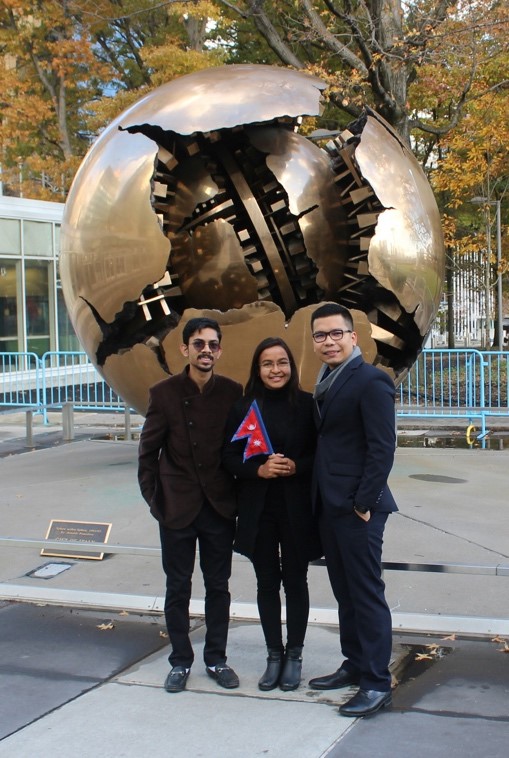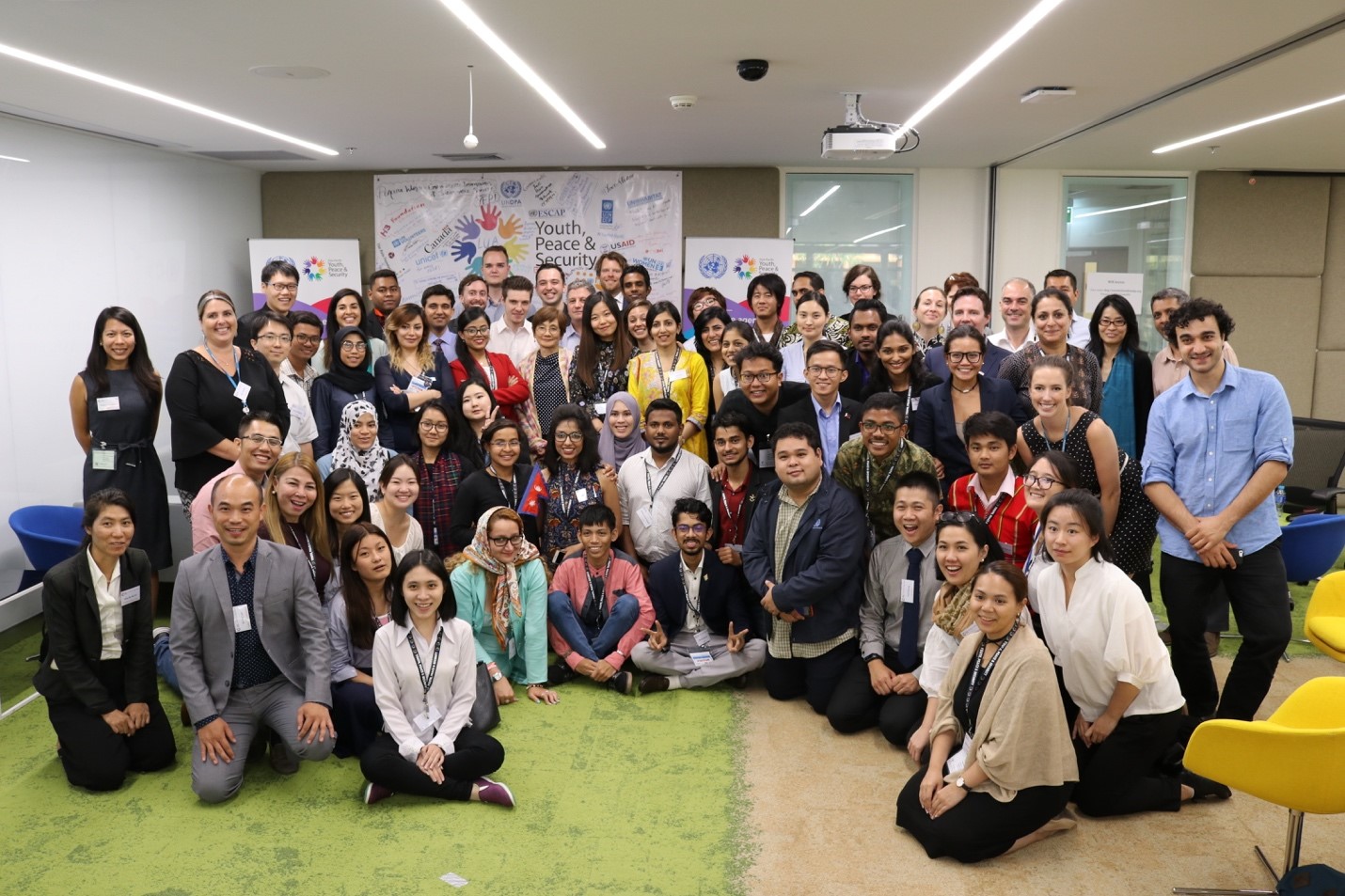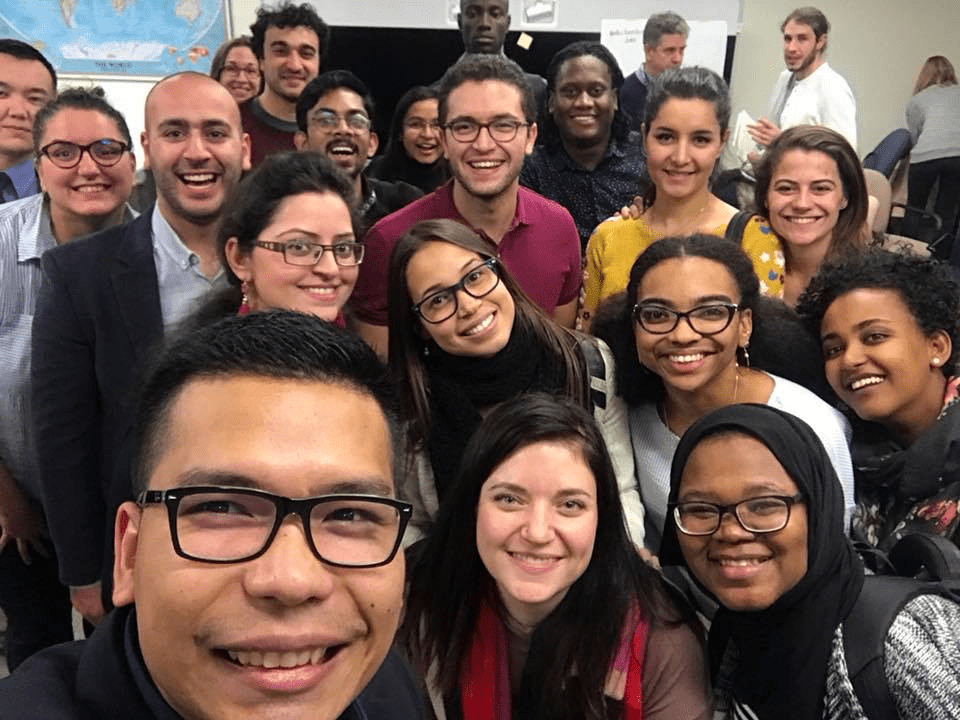On 9 December 2015, the United Nations Security Council adopted Resolution 2250 on Youth, Peace and Security, the first resolution recognizing the positive role of young people in conflict prevention, prevention of violent extremism and peacebuilding. UNSCR 2250 mandates the UN Secretary-General “to carry out a progress study on the youth’s positive contribution to peace processes and conflict resolution, in order to recommend effective responses at local, national, regional and international levels”, and to present the study's results to Member States of the United Nations.
The Asia-Pacific Youth, Peace and Security Regional Consultation was held in May 2017 as part of a series of consultations organized for the progress study. 40 young peacebuilders from across the region drafted their recommendations with regard to the strategic support young peacebuilders need. The final recommendations were shaped in five different categories: Support for Youth Organizations/Initiatives, Mechanisms for the Implementation of UNSCR 2250, Political Inclusion, Education and Social Media.
The final session of the series of consultations organized for the study was the Validation Consultation held in New York in November 2017, jointly organized by the Dag Hammarskjöld Foundation and the UN Population Fund (UNFPA) Peacebuilding Support Office (PBSO), with support from the Government of Canada. Outstanding participants were chosen to present the recommendations from the series of regional consultations around the world.
Here is a three-part blog with insights from the three representatives from Asia-Pacific, Binita Karki (Nepal), Imsouchivy Suos (Cambodia) and Omang Agarwal (India), as they share the validation and how UNSCR 2250 has become a tool for uniting young people for peace.

Asia-Pacific representatives at the UNSCR 2250 Validation Consultation: From L to R: Omang Agarwal, Binita Karki, Imsouchivy Suos (Image: UNFPA)
Uniting the Regions for Global Action I started to read all the reports from the different regional consultations, which were conducted in seven different regions: Arab States, Asia-Pacific, Eastern Europe and Central Asia, East and Southern Africa, Europe, Latin America-Caribbean, and West Africa.
Though we represent our respective regions, which are very different from each other not only geographically but also culturally, all of us shared the same enthusiasm and similar challenges working on building peace.
The recommendations from the different regions were similar to each other which made me feel a sense of unity among young peacebuilders around the world. 18 young peacebuilders from all the seven regions gathered for the two-day programme in the United Nations headquarters. We discussed, prioritized and refined our recommendations collectively making it more specific and practical. Our discussion highlighted topics on ensuring political inclusion for young people, creating online and offline platforms for young peacebuilders to learn and share their experiences, resolving the violence of exclusion, ensuring economic inclusion for women and minorities, and collaborating with national and local government bodies to create an action plan for the implementation of UNSCR 2250.
As a group who represented our own regions and the youth in general we all wanted our voice to be heard. Young people are not only sources of information to be consulted briefly. We are equal partners who can take the lead on strategic action. We look forward to raising awareness of and implementing the Youth, Peace and Security movement globally.
There are two crucial points I realized in working on Youth Peace and Security: 1) that we just begin to scratch the surface of the many issues that are related to Youth, Peace and Security after all these years, yet on the bright side, it is a great start; and 2) that the Validation Consultation and the Progress Study of the UNSCR 2250 involves the 1.8 billion youth population in the world and therefore the recommendations are very important.
While it was an honour and a privilege it was also a big responsibility for us to take part in this conversation. We believe that this meeting was not conducted so that we could check the remaining boxes of the completion of the progress study but it was held so that we could have the discussion on some of the remaining dilemmas and other challenges that could potentially push the progress study forward.
I find it also quite interesting to see that even if there was no one-size-fits-all solution. Regardless, we positively think that the recommendations cover most of the youth issues. It has the power to make positive impacts at local, national, international and global level, especially on the sustainability, inclusiveness and success of peacekeeping and peacebuilding efforts of the youths if they are embraced and implemented correctly.
Our concern now is that the result of the Progress Study should be able to continue the momentum of the conversation in promoting the implementation of UNSCR 2250 effectively and efficiently. It is crucial to maximize this resolution for stakeholders to be accountable in understanding and practicing “meaningful and inclusive participation of youth in peacebuilding efforts”.
Last but not least, it was a pleasure meeting and discussing with other youth leaders and peacebuilders from around the world who also share common goals of attaining peace. This provided us more optimistic views on where the future of the UNSCR 2250 will hold, which is a great incentive that helps motivate us to continue our work with this important living and breathing document of our lifetime.
Victories of Young Peacebuilders on the UNSCR 2250 on its 2nd Year Participation and Prevention – these are part of the pillars of the UNSCR 2250 that resonated perfectly with the validation.
The UNSCR 2250 Progress Study opened the conversation that concerns a third of the global youth population that suffers because of violence, which may be categorized as geopolitical and socio-economic in nature.
However, the conversation extends to involving the majority of the young people due to issues of exclusion and the manifold violence it creates over shorter and longer periods.
The discussion of participation highlighted capacity building and the establishment of platforms that are opportunities to harness the full potential of young people. The highlight for me was the reformative manner in which youth were defined by organisations, multilaterals and civil society in realizing the disparity of their definitions that affects the societal norms, structures and development.
The conversation emerged to understanding the work and engagement of young people in building and sustaining peace at different levels and through multiple approaches. In discussing prevention approaches, the education reform was highlighted. This includes reforming the knowledge, values, actions and skills facilitated by educational institutions. It should also include the cooperation of other stakeholders and involve other innovative mechanisms such as volunteering.
The Progress Study, including the consultation and the validation, is already a big victory for the second year of the UNSCR 2250. This initial victory is due to being considered the first of its kind at the United Nations to focus on young people as actors in development and peace.
I recognize that we have much more to do before we reach genuine victory, but it cannot be discounted that we have gone a long way from a resolution to evidence collected to young people building and sustaining peace.
We should unite all efforts from grassroots, national, regional, and international stakeholders to continue the victories we have started by upholding the true nature of the resolution in building and sustaining peace with and for young people.
Youth Voices on Peacebuilding in Asia-Pacific: Watch this cool two-minute video and join the conversation on Twitter at @UNFPAasia! #Youth4Peace #UNSCR2250

UNFPA organized the first-ever Youth, Peace and Security Consultation for Asia-Pacific in May 2017: 40 participants from almost 20 countries!


